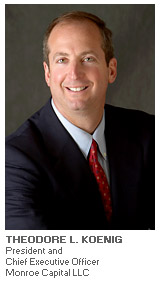
In looking back, Ted Koenig, president and CEO of Chicago-based Monroe Capital, attributes his company’s success to many factors. Yet he asserts the company, which is on an apparent growth spurt as others scale back, has been guided largely by a simple principle as articulated by investor Warren Buffet. Koenig says, “‘Be aggressive when others are cautious and be fearful when others are greedy.”’
Whether fundamental to the company’s success or a fanciful concept, the facts speak for themselves. Monroe Capital has navigated the choppy waters of the commercial finance industry deftly and in recent weeks has caught the industry’s attention with the closing of an IPO, an increase in its credit facility, the launch of a healthcare finance company, the establishment of an ESOP lending vertical and the opening of a new office in Atlanta.
But to understand the where the company is today, Koenig insists it’s important to understand its evolution. He and his team launched Monroe Capital in 2004. He remembers, “Back then in 2004 and all the way into 2007, we were experiencing a very frothy market. Our goal at Monroe Capital was to create a relevant lower middle-market lending platform doing both sponsored and non-sponsored financing transactions. When the financial crisis hit in late 2007 that lasted through 2009, many of our competitors fell by the wayside either as market-related casualties or because of internal issues. But we had good people and were able to fight through the crisis and we actually made a fair amount of money during that time because there were many opportunities for firms with stable and locked up capital. And when the market emerged post-crisis, we were one of the last guys standing in our space. We built a very good brand, a strong platform with great people and we had a solid track record both before and during the worst financial crisis I have seen in my career. Those factors have propelled us post crisis.”
 Today Koenig describes Monroe Capital as a middle-market focused debt provider with a platform comprised of private institutional funds under management. Investors consist of state, county and local pension funds, universities, charitable endowments and foundations, and corporate and high net worth family offices. The closing of Monroe Capital’s IPO on October 31 ushered in a new era for the company. “In addition to our large institutional platform, we now have another platform that is a public business development company that invests in middle-market debt as well.”
Today Koenig describes Monroe Capital as a middle-market focused debt provider with a platform comprised of private institutional funds under management. Investors consist of state, county and local pension funds, universities, charitable endowments and foundations, and corporate and high net worth family offices. The closing of Monroe Capital’s IPO on October 31 ushered in a new era for the company. “In addition to our large institutional platform, we now have another platform that is a public business development company that invests in middle-market debt as well.”
The company also maintains a platform that issues and manages collateralized loan obligations (CLOs) for institutional investors in that arena and a financial advisory business, which serves as an investment bank helping middle-market companies raise capital. And most recently, the company announced the launch of a healthcare lending vertical.
Koenig sums it up, “That’s what Monroe consists of today and each of the business units is synergistic. All are in the middle-market niche and there’s considerable overlap in terms of the value add that we can bring to our customers in the marketplace … our borrowers and investors."
As for the IPO and the formation of Monroe Capital Corporation, Koenig explains it was an idea whose time had not only come, but had come by necessity. “We have been growing at a substantial clip over the three years since the debt crisis and we had outstripped our ability to keep pace with raising capital in the private markets. So, it was only natural to add the public side of the business as well. As our business has continued to grow, it’s clear to us that our model works … the borrowers like it and the market likes it as evidenced by the fact that each year we do more and more business. And more importantly, our LPs and investors like it. We needed to have a public funding option as well as the private option.”
And Koenig explains that investors and partners are treated equally. He says, “There’s no conflict or cherry picking whatsoever … we take our responsibility as managers very seriously. So, all of our investment vehicles share our investments on a pro rata basis.”
As it often happens, necessity and opportunity go hand-in-hand. With that, Koenig expects the public offering to fill the void in financing the lower end of the middle market where the regulatory concerns have rendered banks and finance companies less efficient. He adds, “Hopefully this public offering is going to address those growth concerns. The offering also provides a whole other class of investors an opportunity to invest in Monroe. To date, only the largest pension funds, universities and endowments have been able to invest with us. With a strong track record we’ve delivered to the large institutional market for nearly ten years, we’ve opened that up to the public. Now they can achieve the same types of returns that the larger and more sophisticated investors have been getting with us.”
With regard to the launch of MC Healthcare Finance announced on November 14, that was a move motivated less about necessity and more by opportunity. Koenig says, “We had been looking at this business for a couple of years now and planning our entry into it. Right now, we’re in the ‘perfect storm’ to start up this business given the fact that uncertainty over the future is the number one concern in today’s healthcare market. And traditional lenders don’t like uncertainty … it causes panic and concern and lenders have a hard time reacting in uncertain economic situations.
“Then it was clear to me that the Affordable Care Act, or Obamacare, was here to stay. That means that 20% of the population that hasn’t been insured will now be insured. That sounds great, but there’s no payment mechanism legislated for that. Yes, there’s insurance but there’s no payment mechanism and this is going to strap healthcare providers significantly from a capital standpoint. Those on the lower end of the market are going to be hit the hardest.”
With that, Koenig and his crew expect the Main Street healthcare providers – home health providers, doctor groups, surgicenters, smaller hospitals and nursing homes – to be left in the lurch as traditional sources of financing move away from these types of borrowers. Koenig states, “These types of businesses have been hit hard in every downturn … it’s one of the areas that’s always been shunned by banks in tough times. But for us, it’s a natural … it jumps out at me and says ‘there’s an opportunity here.’ And as long as we put together the right infrastructure of people and systems, which we have done by the way, we can be very successful in this space.”
From a broader perspective and with regard to the commercial finance landscape, Koenig sees more opportunities on the horizon. “Many people are coming back into the business and that generally happens after a downturn. And I think we’ll continue to see more, but it winds up being inefficient because the larger companies continue to move upstream and that leaves some holes in the middle and lower end of the market.”
At the same time, Koenig also notes that government regulation and restrictions on capital formation have complicated the ability to raise capital. Add to that, today’s investors demand much more than they have in the past. He states, “Nobody wants to lose money … they’ve tasted it and they don’t like it. Investors require more from a credibility standpoint – the management teams, the diligence, the track record – all of those things have become more important than they were five or six years ago. Sophisticated investors are more discriminating with their dollars today which is creating a high barrier of entry in our business.”
In short, Koenig says the business has become more difficult from all angles and he expects that dynamic to continue. “But, therein lies the opportunity,” he states. “And that’s why I like what I see. We’ve been at this for almost ten years and we’ve delivered returns in the mid-teens or better each and every year … even during the crisis. We’ve done what we have said we would do irrespective of the market environment. And I think there’s an opportunity to build an interesting niche finance business in and around the middle market in which you are not constrained by some of the government regulations.
“If you’re thoughtful, you can navigate through the capital markets just as we did with a public offering. You can find way to create value for your limited partners and your shareholders. And it all goes back to the people and the platforms you have in place. We’ve spent a lot of time on those two things … the people and the platform.”
And Koenig doesn’t take either for granted. If success has come, he says, it’s because of these two essential elements. “We’ve sought to build a platform for the long run as opposed to the current cycle. I think that’s what gets most people in trouble in this business – they build a fund or a business for a particular cycle. And when that cycle turns, they get caught in a model that’s upside down.”
As for the people, Koenig concludes, “In the end, this is a people business … it’s not a capital business, not a systems business. And we’re always looking for the best people in all areas of our business. If you look at our organization top to bottom, we don’t have the most capital or the cheapest capital. We may not have the best brand name, but we’re doing pretty well on all those fronts. But I believe that we have the best people and that’s crucial. And quite frankly, it’s what I’m most proud of.”